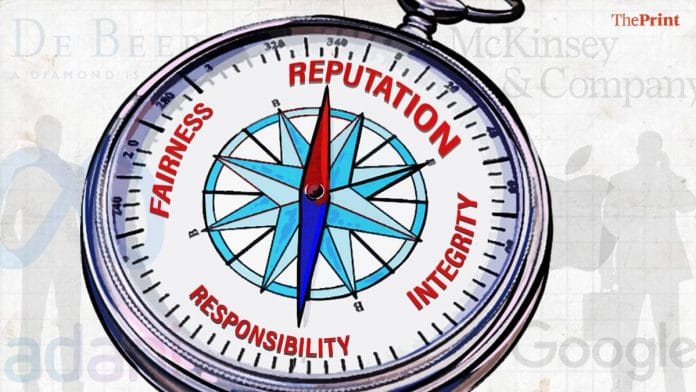After the Johnny Depp-Amber Heard verdicts, after an incumbent-turned-insurrectionist retains his grip on the Republican Party in the US, and after Britain’s flaxen-haired liar and potential treaty-breaker continues as Prime Minister, it is a fair question: Does reputation matter? Or consider companies. On Business Standard’s ‘World’ page yesterday (17 June), there were the following news items: Google fined; McDonald’s to pay $1.3 billion (in a tax case); Toshiba, Sony lose court fight (over cartelisation); and Apple accused of misleading iPhone users. There was also a fifth: Meta, Google, Twitter “vow” to fight fake news or risk penalties. For good measure, Meta also figured in a story where it “vowed” (that word again) to meet French anti-trust concerns over online ads.
They say that a company’s reputation is its most valued asset. But how many of these companies will suffer any serious damage after even successive misdemeanours? After all, newspapers that sell their news columns for cash continue to have millions of readers, the big accounting firms continue to build associated businesses despite in-your-face conflicts of interest, and de Beers, despite its history with “blood diamonds”, is still dominant. Occasionally an Enron goes bust when exposed as a house of cards, but McKinsey stalwarts were involved with several scandal-hit companies and is still viewed as the gold standard in the consulting business.
Corporate misdeeds have a history of beginning as scandal and ending up as folklore, from the activities of the American robber barons (one bought up the majority of Pennsylvania state legislators, to get a railway line through) to Dhirubhai Ambani’s early exploits and now Gautam Adani’s unshrouded clout. In India, there have been books on the gas-pricing wars and the telecom heist. But our scandals usually have no culprits — similar to how none of the chieftains of the American financial giants went to jail for criminal acts of deliberate mis-selling and for engineering financial collapse. Mid-level bond traders did, though, in New York and elsewhere.
Also read: How would India fare on a ‘modified’ misery index? Better than US & UK, worse than most others
If one were to look for a typology, it might run as follows: If you are known to be a sharp businessman, being exposed for sharp practices does you no harm — just as a party known for pushing Hindutva risks little if it is rude about another religion. But if your firm stands tall in the public mind, a scandal can cause damage — though usually repairable at some cost, as Volkswagen, Toyota, and others have found. And if your firm was on shaky ground to begin with, a scandal can spell finis. The key question would appear to be: Does the scandal fundamentally change the way a company’s, an individual’s, or a political party’s “public” views it/him? If not, you get the longevity of Donald Trump and Boris Johnson.
There are of course many publics, so “reputation” is actually a many-splendoured thing. Investors, consumers, employees, vendors, distributors — stakeholders of every sort — see the different faces of a company. Is it a good employer? Does it pay its bills on time? Is its store located conveniently close by? Does it fund your university department’s research programme? Does it have the best crossword? “Reputation” therefore is a more complex thing than what crumpled when Ralph Nader said cars were “unsafe at any speed” or Rachel Carson’s Silent Spring damned the pesticide industry, or when news was put on sale.
Besides, if it is in your interest to not see that an enterprise has destroyed mangroves, you won’t see it. It took a decade of misdeeds, including a money-laundering scandal, before Deutsche Bank lost seven-eighths of its market value. If Google has the best search algorithms, that is what matters to computer users — not whether it is using its might to destroy the news business.
From a utilitarian viewpoint, whether a company cheated on taxes or destroyed the lives of tribals is for someone else to worry about. Which is why the brief fashion of investing on the basis of ESG (environmental, social, governance) considerations is now under question. In such a practical age, whether a country offends your religious sensibilities can be overlooked if it is a key customer for your gas or oil.
By special arrangement with Business Standard
Also read: Corporate India has never had it so good, but under-consumption continues to undermine economy






